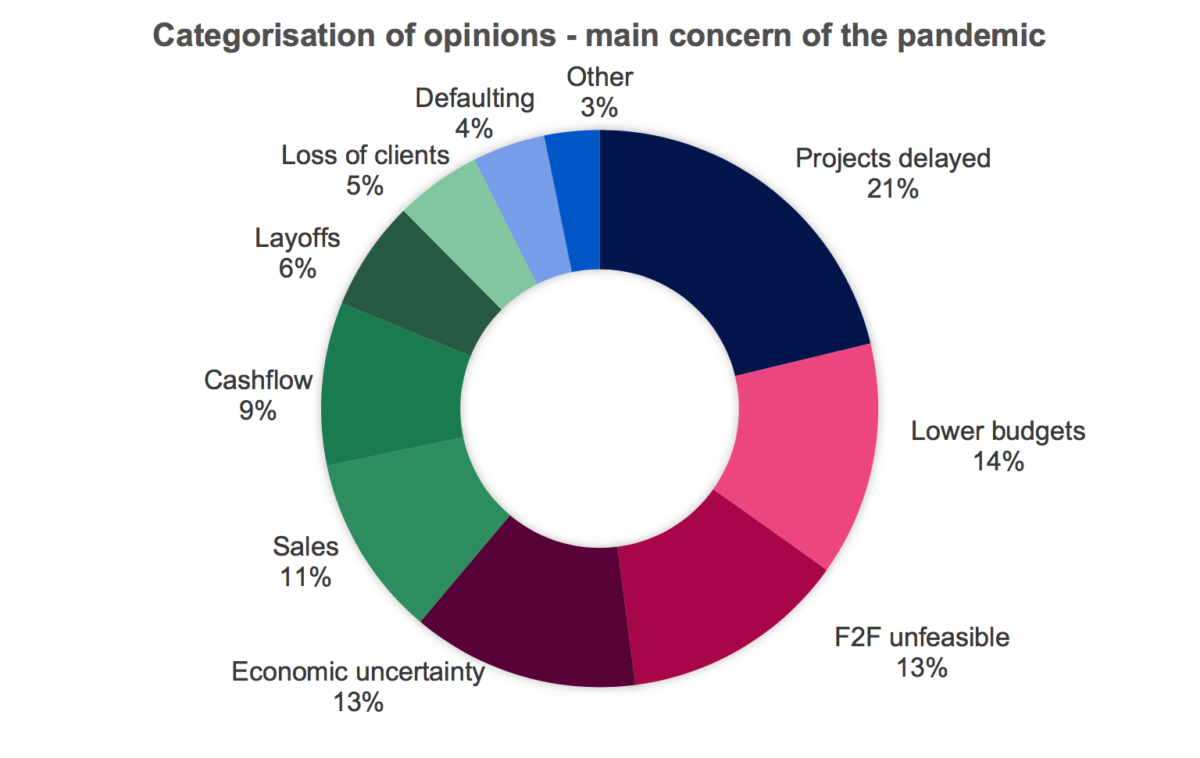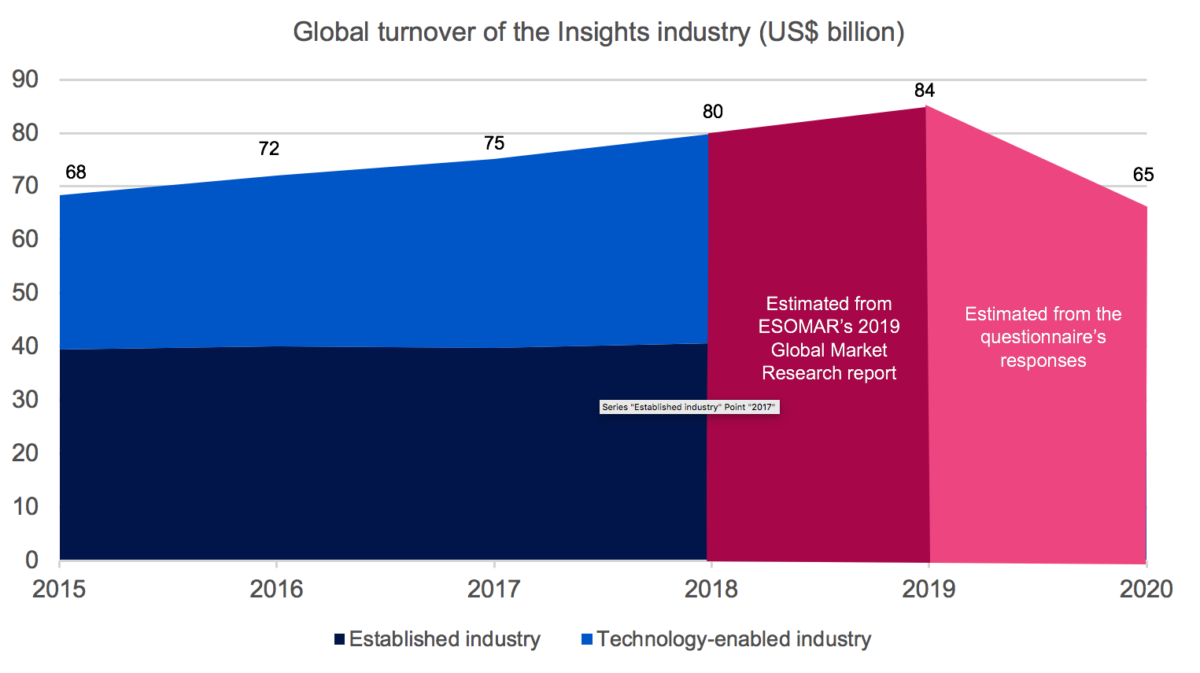Last April, ESOMAR carried out a survey among insights professionals around the world to understand the impact of the pandemic in detail. The results, published in the dedicated report Insights in times of COVID-19, presented an industry deeply affected by social distancing measures announced by national governments, employees struggling to adapt in many cases to a new work environment at home – in many cases reporting an improvement to their quality of life –, demand from certain types of clients dropping and the natural phasing of the pandemic in different countries and regions over time.
The cycle of the research industry
ESOMAR’s report showed that the high levels of uncertainty the world lives in translated into reduced investment, lower demand and a general disruption of the normal flow of the industry. Some brands completely stopped their marketing and advertising efforts, while others, such as the FMCG brands, proved to be quite resilient as people still needed to eat, drink, clean and wash.
As research users/clients adapted their research efforts by delaying, cancelling, or not commissioning research, some agencies found themselves struggling as a result, and many expressed fear about a deep change of paradigm in which the focus and application of research will fundamentally change to a higher-level, more essential and spontaneous activity, or perhaps one in which it would be the mode and design that will need to evolve.
Agencies mentioned the risk of a loss of clients resulting from a shrinking demand and the freezing, delay or cancellation of projects. Without clients, research companies could find it more difficult to stay afloat. This was a particularly acute concern for small and medium companies with smaller shock absorption capabilities which, being an integral part of the economic network in many countries, could jeopardise the continuity of a vast amount of research. Companies with face-to-face facilities found themselves dragging on a sunk cost which could not be mitigated, a rather serious problem outside of the top 20 markets globally, where face-to-face methods are considerably more popular yet much more difficult to implement under lockdown.
Employees found it difficult to balance their working hours with their private life. Many reported working more hours than required, as they found it difficult to simply stop at a specific time. Having family members such as children in the household made conciliation difficult, but there were also many reports of people living healthier lives, hoping to be able to work from home more often, doing more sports and generally improving their quality of life. The versatility of digital communications gives employees the chance to have much quicker discussions instead of lengthy meetings with limited value.

The estimated economic impact
The report showed, overall, a clear impact of the pandemic on businesses, which is generally negative. All in all, up to 92% of all respondents claimed to expect either a slight or a large negative disruption, while the remaining 8% expected either no change, a slight improvement, a big improvement or simply did not know. Clearly, companies ought to have prepared for a downturn that seemed inevitable.
At a global level, the Insights in times of COVID-19 report forecasted a reduction in turnover of up to 22% for all research-related companies, and 11% for research users/clients. According to ESOMAR’s 2019 Global Market Research report, the global size of the insights industry was found to be US$ 79.83 billion for 2018: US$ 40.74 billion for the established industry, and US$ 39.09 billion for the technology-enabled one. Since the estimated size for 2019 will be presented in the 2020 Global Market Research report, expected by September of the present year, and is therefore unknown as of yet, we can use the growth estimate from the IMF (+6.2%).
Should the aforementioned forecast of a 22% decrease prove to be accurate, we could see the industry shredding US$ 18.7 billion of its value in just one year. The corresponding partition per type of industry shows a potential decrease of the established sector of 18% globally and that of the technology-enabled one of 7% globally.

The regional impact
In Europe, the reduced output caused by the crisis is feared to amount to 32%, and that of the insights industry to a full one third, although it varied substantially per country. Italy was expected to be the country where output would to suffer the most substantial drop, almost halving its size (-49%). Other countries with significant anticipated drops were Bulgaria (-39%), Slovakia (-34%) and Portugal (-34%). On the other hand, the countries with the smallest expected impact were Norway (0%), Belgium (-4%), Russia (-6%) and the Netherlands (-7%).
In North America, aggregated turnover was expected to drop 18%, although most of that drop belongs to the lower expectations harboured by Americans (-18%) as compared to their Canadian neighbours (-6%). A look at the 2019 Global Market Research report shows how the crisis caused by the COVID-19 pandemic could slash output for the insights industry in the USA by as much as US$ 3.7 billion in 2020.
In the APAC region, estimates varied from -19% in the case of Singapore to -35% in the case of Thailand, where the agencies focused on data analytics were better suited to wade the storm, as their type of service often does not rely on direct methods of data collection. A remarkable estimation was that of South Korea, which expected an overall flat impact on its domestic business (0%), possibly due to the excellent response to the pandemic by the government as compared to the rest of the world.
In the LATAM region, countries showed a rather unified forecast of the economic impact of the COVID-19 crisis in the industry, with assessments ranging between -20% and -29% for most countries. This region however, currently reporting most of the cases of the disease in the world, is yet to present a clear assessment on the impact of the pandemic on the industry.
Finally, the Middle East and Africa placed the region as the hardest hit, with projected declines in industry output of, in certain cases, more than 50%. The traditionally volatile markets of these regions, the disruption of the direct means of research such as face-to-face – the main methodologies for many of these countries – paired with a strong sense of uncertainty, have eroded expectations to the lowest of all world’s regions.
Insights in Times of COVID-19
The report Insights in Times of COVID-19 was published in May of 2019 and can be found in ESOMAR’s website. This report offers an in-depth look at the situation of the industry through several lenses. The study dives into the current crisis and presents the situation from the points of view of research clients as well as research suppliers in both the established and the technology-enabled sectors or consultants. It also looks at the economic impact for many of the countries of the world, and presents the opinions, fears and desires of the individual respondents as they adapt to remote methods of research, working from home, economic uncertainty and the difficult disruption the pandemic had in the lives of most of the world’s population.
ESOMAR will host a webinar next 14th of July to delve in detail on some of the elements of the report and discuss how the industry has adapted to the current situation. If you would like to join this interesting discussion, just subscribe here.


